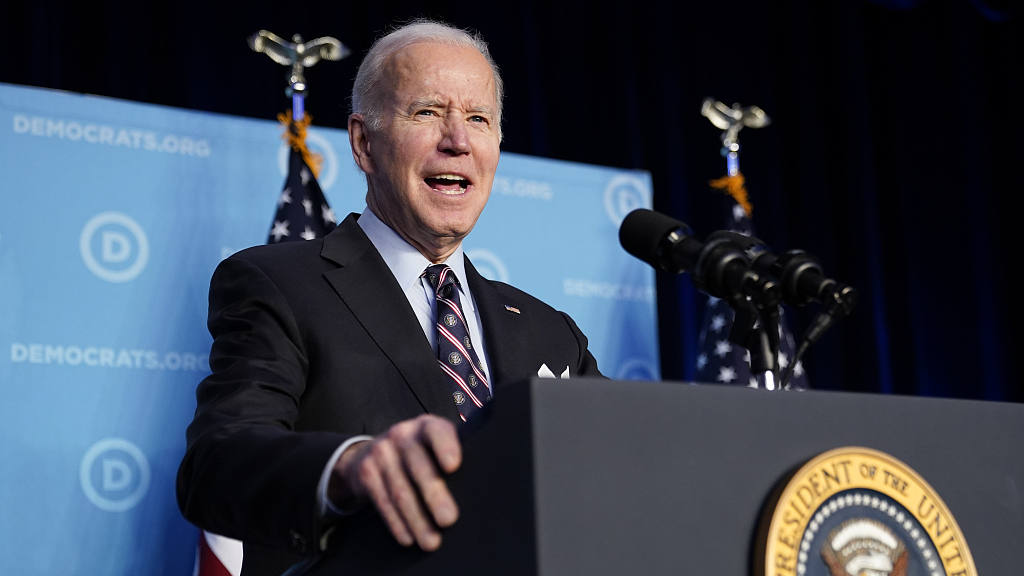
U.S. President Joe Biden speaks at the Democratic National Committee's Winter Meeting in Washington, March 10, 2022. /CFP
U.S. President Joe Biden speaks at the Democratic National Committee's Winter Meeting in Washington, March 10, 2022. /CFP
Editor's Note: Zhou Wenxing is assistant professor at the School of International Studies at Nanjing University and a former Asia Fellow at the John F. Kennedy School at Harvard University. He writes extensively on comparative politics and international relations, with an emphasis on the Taiwan issue and China-U.S. relations. The article reflects the author's opinions and not necessarily the views of CGTN.
U.S. President Joe Biden signed a fiscal omnibus bill titled Consolidated Appropriations Act, 2022 on March 11 that was proposed by a House Democratic Representative nearly one year ago. The $1.5 trillion must-pass spending package matters to the American government and its people because it averted a partial government shutdown. What concerns Chinese people about this 2741-page omnibus bill, and now a public law, is that it carries a Taiwan-related provision, another needless provocative move stabbing Chinese core interests on the Taiwan question.
The provision, which is merely a one-sentence paragraph in the law, proposes that "None of the funds made available by this Act should be used to create, procure, or display any map that inaccurately depicts the territory and social and economic system of Taiwan and the islands or island groups administered by Taiwan authorities."
This provision seeks to change the status quo in the Taiwan Straits that both sides belong to the same China, indicating American politicians' attempts to separate the Taiwan region from China. Such efforts are unlawful. They would also cast another cloud over the troubled relationship between the U.S. and China, pushing East Asia and even the Pacific region into greater uncertainty and instability.
It should be noted, however, that there remain some ambiguities in the provision. It failed to specify what constitutes an accurate or "inaccurate" map of the Taiwan region. More importantly, the provision used the word "should" to express lawmakers' policy stance and suggestions. The executive branch, including the Departments of State and Defense, could choose not to implement these suggestions unless they are articulated with binding words such as "shall" and "must."
This reflects the basic logic and behavior pattern of U.S. Taiwan policy.
On the one hand, the U.S. has adopted various clarified policy measures to strengthen its "rock-solid commitments" to the Taiwan authorities. In addition to a growing number of Taiwan-related legislative proposals, the U.S. government has been sending a record-high number of warships transiting through the Straits and selling more advanced defense weapons to Taiwan, among others. By doing these, the U.S. government has continuously undermined its one-China principle, a consensus reached with its Chinese counterpart in the three joint communiques and a long-held political foundation for the bilateral ties.
On the other hand, the U.S. nonetheless deliberately maintains some ambiguities so that its hands will not be tied. A case in point is that the American president refuses to clarify whether the U.S. would send troops to the Straits to "defend" Taiwan should an armed conflict occur in the Straits.

Street market between buildings in Taipei. /VCG
Street market between buildings in Taipei. /VCG
To better understand the latest enacted law, one needs to review the history of China-U.S. relations. The U.S. never planned to withdraw from the Taiwan Straits affairs. The bilateral relationship between China and the U.S. suggests that the most critical factor influencing its Taiwan policy is American leaders' perceptions of China.
When China was thought of as a quasi-ally to counter the Soviet Union in the 1970s and 1980s, the U.S. showed greater respect for China's concerns on the Taiwan question and thus refrained from intervening in the issue. When China was interpreted as a "complex challenge" in the early 1990s, as depicted in the National Security Strategy of the United States issued in 1991, the White House and particularly Congress were more enthusiastic about meddling in the Straits affairs.
In other words, the extent to which the U.S. intervenes in the Taiwan question is closely related to its policy orientation toward China.
As China's comprehensive power continued to grow and, in the eyes of more American political elites, posed a "threat" to America's global hegemony, the U.S. turned its former strategic ally and important partner into an enemy. It is against this backdrop that the past five years saw a paradigm shift of U.S.-China policy and, accordingly, more U.S. efforts to intervene in the Straits.
Therefore, the Taiwan-related provision in the law could be deemed a prime example of U.S. interference in China's domestic issues in the context of the alleged U.S.-China strategic competition. It is yet another example of American elites reneging on their promise on the one-China consensus. Undoubtedly, the law exposed the hypocrisy and self-interest of American politicians.
Although President Biden has already signed this bill and made it a law, enlightened political elites on both sides of the aisle could take some measures to reduce the negative effects brought by this law. Lawmakers in Congress should refrain from further provoking the Chinese government and Chinese people by introducing other Taiwan-related legislative proposals.
What's more, Biden and his executive branch could set aside the provision and reassure the Chinese government that they have no intention to change the U.S.' one-China principle. The one-China principle has been the "common-sense guardrail," as Biden called it, to ensure stable U.S.-China ties. The U.S. should not expect a stable relationship with China while dismantling the "guardrail."
(If you want to contribute and have specific expertise, please contact us at opinions@cgtn.com. Follow @thouse_opinions on Twitter to discover the latest commentaries in the CGTN Opinion Section.)

